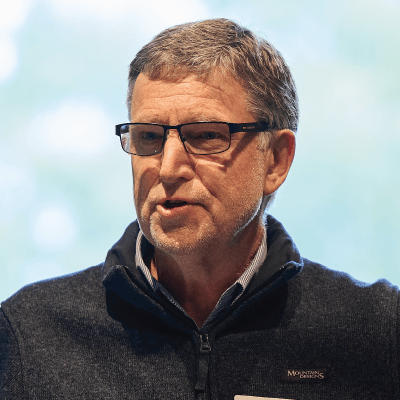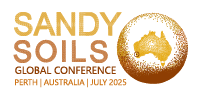2025 Sandy Soils Speakers

Tim Boyes
(B.Bus Agriculture Curtin University) Tim has developed his agronomy and agricultural production systems knowledge through working closely with farmers throughout the Great Southern, Upper Great Southern and Central Wheatbelt of Western Australia over the last 26 years. Tim believes agricultural innovation and research begins and is nurtured at farm level, and that working closely with farmers can deliver important learning and problem solving outcomes and incremental advances. Tim is focused on delivering a full service agronomy model from rotation planning, soil and plant testing and nutritional advice, to in-crop implementation of integrated and sustainable herbicide, insecticide and fungicide programs. Tim is focussed on the fundamentals of crop and pasture production to deliver profitable and sustainable cropping outcomes for his clients. Tim has a passion for soil science and soils research with particular focus on nutrition and amelioration of soil constraints.

Keith Bradby
Keith is a long-time advocate for the ecological values of south-western Australia and for the power of local communities. He helped establish some of Australia’s earliest landcare groups; has run building, beekeeping and native seed businesses; consulted to the farming and mining sectors; as well as working in rural enterprise development and at a policy level in government. In the early 1990s he reformed management of the Peel-Harvey catchment program, where fertiliser loss from sandy soils was blamed for massive downstream eutrophication, and then documented a broader perspective on the issue in a book. He also co-wrote and narrated the award winning film ‘A Million Acres a Year’, which documented the spread of agriculture onto some of WA sandiest farming soils, and the immediate aftermath of that. Keith has also worked with colleague groups in New Zealand, southern Africa, Baja California and the USA. He is a past Chair of the WA Landcare Network and is currently CEO of the large landscape restoration program Gondwana Link, which he was part of establishing in 2002.

Mark Dobrowolski
Mark Dobrowolski is Principal Rehabilitation Scientist at Iluka Resources Ltd, a global critical minerals company specialising in zircon, titanium dioxide, and rare earth minerals. Iluka Resources has expertise in exploration, mining, processing, marketing, and rehabilitation. Mark also holds academic positions as an Adjunct Associate Professor at the Harry Butler Institute, Murdoch University, and as an Adjunct Senior Lecturer at the School of Biological Sciences, The University of Western Australia.
With a background in soil science and plant biology, Mark has extensive experience in university, government, and industry-based research, focusing particularly on the rehabilitation of mined land. For 18 years, he has worked in the mineral sands and bauxite mining and processing industries, conducting research to ameliorate soil water and physical factors that inhibit successful re-vegetation following mine closure. He collaborates closely with plant ecologists to set achievable targets for the re-vegetation of mined land. At Iluka Resources, Mark leads efforts to improve rehabilitation practices.

Dr Melissa Fraser
Dr Melissa Fraser is the Director and Principal Consultant at Soil Function Consulting with over 20 years’ experience in agricultural research and extension across South Australia, Victoria, Queensland and the Northern Territory. Mel specialises in overcoming constraints on sandy soils to increase productivity in the low and medium rainfall zones. She is considered a regional soils expert, maintains a vast industry network and is a popular guest speaker and educator across the Southern Region. She is passionate about extension and famer education and plays a vital role in the development and delivery of activities to support the adoption of research outcomes.

Dr Richard George
Richard is a land and water resource scientist who leads a team focused on the assessment, analysis and communication of hydrologic research for agriculture. The team conducts applied science with WA farmers and industry, engaging in research partnerships with universities and various national and international agencies. In the last decade the team have assisted with irrigated agriculture development projects across Northern WA, analysis of land and water salinity risks to WA soils and developed a range of exploration and analytical tools for assessing hydrologic condition of WA farming systems.
With 40 years of experience, Richard has published widely, is Deputy Chair of the Soil and Land Conservation Council (WA) and holds adjunct professorships at both the University of Western Australia and Murdoch University. Richard’s teams’ current projects are focussed on providing research to underpin water requirements for farmers, industry and regional communities, dealing with reduced supplies and increasingly drier and hotter climatic conditions. Options include improved surface water capture and storage, finding unconventional aquifers and utilising treatment systems such as desalination. The team is also developing and communicating products using machine learning and advanced AI applications that map and quantify landscape and geologic conditions, water storage and enhance preparedness for droughts and other water related issues.

David Hall
David Hall is a Principal Research Scientist with the Department of Primary Industries and Regional Development based in Esperance, on the south coast of Western Australia. His research, over the past 42 years, has focused on management options and systems that overcome multiple soil constraints to dryland crop production predominately in sandy soils. In particular, he has undertaken research on the management of wind erosion, water repellence, subsoil compaction and acidity in the sandplain soils of Western Australia.
David has specific interests in the use of tillage (strategic deep, minimum tillage) and amendments (clay, biochar, compost, lime and gypsum) and their combinations to overcome physical and chemical limitations in sands that impede agricultural production. Along with his colleagues, this research has resulted in transformational changes to farming practices leading to sustained improvement in crop yields. It has also let to substantial investment by industry in soils research in Western Australia.
David has participated on international projects on sandy soils in Vietnam. He has also investigated the use of sands as novel amendments in sodic clay soils. The breadth of David’s research can be found on: https://scholar.google.com/citations?user=YgAWyAQAAAAJ&hl=enholar

Edyta Hewelke
Edyta Hewelke is an Associate Professor at the Institute of Environmental Engineering at Warsaw University of Life Sciences, Poland. The main scientific area of interest concerns environmental protection and engineering issues.
Her scientific research focuses on the sustainable management of natural resources, including the physical properties of soils, soil protection, sustainable use of soils, and nature-based solutions to improve the quality of the soil environment of the climatic and anthropogenic environmental threats. The issues of her research work concern the following areas: hydrophobic properties of soils, functions of pedotransfers as indirect methods of determining the retention characteristics of soils, improvement of research methods for hydro-physical properties of soils, fires as a threat to the balance of environmental processes, possibilities of carbon sequestration in agricultural soils in the era of changing climate. She implements educational issues for sustainable development and environmental management.

Hans Lambers
Hans Lambers was born in the Netherlands, completed his PhD in 1979, and was appointed Professor of Ecophysiology at Utrecht University in 1985. In 1998, he migrated to Australia and was appointed Professor of Plant Biology/Ecology at the University of Western Australia, where his research focuses on the mineral nutrition of Australian native species, particularly how certain Australian plants acquire phosphorus from nutrient-poor soils and use it with remarkable efficiency.
He has published over 675 papers and features on Clarivate’s Highly Cited lists in Plant and Animal Sciences, with an H-index of 100. He was elected to the Royal Netherlands Academy of Arts and Sciences in 2003 and to the Australian Academy of Science in 2012. He has received Honorary Professorships from China Agricultural University (2002), the Chinese Academy of Sciences (Research Centre for Eco-Environmental Sciences, Beijing) (2004), Shenyang Agricultural University (2018), and Jiangxi Agricultural University, Nanchang, China (2019).
His further appointments include Distinguished Professor at the National Academy of Agriculture Green Development at China Agricultural University (2019–2023; 2024-2027) and Strategic Scientist at Beijing Forestry University (2024–2028).

Ekrem Ozlu
Dr Ekrem Ozlu is an assistant professor and extension soil management specialist at Vernon G James Center and Department of Crop and Soil Sciences, North Carolina State University. Dr. Ozlu completed his B.S. in Soil Science in the Department of Soil Science and Plant Nutrition, Ataturk University, Erzurum, Turkey. He completed his M.S. in Applied Soil Physics in the Department of Plant Sciences, South Dakota State University. He received his Ph.D. in Soil Physics and Management in Department of Soil Science, University of Wisconsin-Madison. He worked for two years as postdoctoral research associate at Great Lakes Bioenergy Research Center and W. K. Kellogg Biological Station, Michigan State University. Dr. Ozlu’s expertise on soil health, soil organic matter, and saltwater intrusion. Dr. Ozlu specifically work on tillage managements, cover cropping, and cropping systems decisions.

Chris Saunders
Dr Chris Saunders is an Agricultural Research Engineer and has a PhD in engineering soil dynamics related to the mouldboard plough from Cranfield University in the UK. He has over 20 years’ experience in engineering research of agricultural machinery and technologies in Australia with much of his research contributing to engineering for sustainable and resilient agriculture. More recently his research has focussed on tillage and amelioration machinery to overcome soil constraints in sandy soils and landscapes across grain growing areas of Australia. Chris has expertise in mechanical and machinery solutions for a wide range of agricultural practices and his work includes simulation of soil tool interactions with Discrete Element Method (DEM) to evaluate amelioration machinery, technology and techniques to help growers improve the yield potential of their land.

Craig Scanlan
Dr Craig Scanlan is a Principal Research Scientist at the Department of Primary Industries and Regional Development in Western Australia. Craig has over 20 years’ experience in research and extension in nutrient management in grain production. His recent work has included interactions between soil constraints and fertiliser application, phosphorus and potassium cycling in crop sequences and soil test calibrations for wheat. His research has mostly focussed on field experiments in the wheatbelt of Western Australia. Craig has led GRDC funded projects in collaboration with Murdoch University, University of Western Australia, Curtin University, CSIRO and industry partners. He has adjunct research fellow positions at Murdoch University and University of Western Australia.
